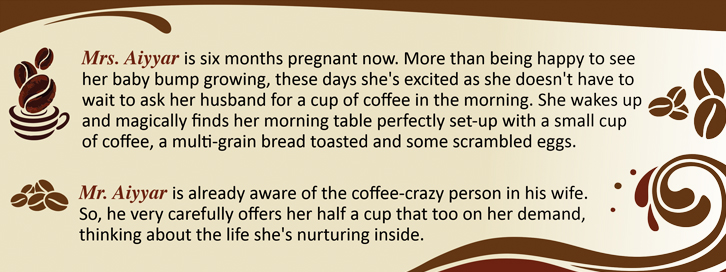Table of Contents
- Why Should Coffee Not Be Your Best Friend During Pregnancy?
- Increase in Foetal Heart Rate
- Irregular Foetal Heart Beat
- Affects the Growth of the Baby
- Causes Anaemia
- Extends the Labour Date
- Increases Chances of Miscarriage
- If You Can’t Drop It Then Reduce It!!
- Think of Healthier Substitutes
- Nothing is Permanent!

Yes! We all know motherhood demands a lot of sacrifices and readjustments of likes and dislikes. And giving up on her favourite coffee may be just one of them.
However, we have some good news for all the would-be mom’s coffee fanatics. They can continue their love-affair with coffee during their pregnancy. But needless to mention in absolute moderation.
As per the guidelines from the American College of Obstetricians and Gynecologists (ACOG), “Moderate caffeine consumption (less than 200 mg per day)[1] does not appear to be a major contributing factor in miscarriage or preterm birth”. Less than 200 mg per day means that is approximately 1 to 2 standard cups of coffee, which may not be harmful during pregnancy. Provided that is the only caffeine-intake throughout the day, apart from tea, aerated drinks, kola nuts and some over-the- counter medications, which are all caffeine-stimulant.
But why?
Why is excessive caffeine-intake harmful during pregnancy?
Read on to understand
Why Should Coffee Not Be Your Best Friend During Pregnancy?
Too much of coffee may increase the concentration of caffeine in the body of a would-be-mother.
Caffeine is metabolized slowly during pregnancy. So, it lingers on the maternal blood for a longer period of time. It then passes from the placenta to the foetal circulation. The organs in the growing foetus (baby) are still in the developing stage and it also takes its own time to process the caffeine. This can cause several side effects, like:
Increase in Foetal Heart Rate
Excessive caffeine-intake may result in increased catecholamine hormone levels in the foetus. It therefore decreases the oxygen flow to the foetus and increases the foetal heart rate.
Irregular Foetal Heart Beat
With excessive caffeine-intake, there is a tendency of the tissues (that separate the foetal heart chambers) to become thinner. This can further damage the heart and result in irregular foetal heartbeat.
Affects the Growth of the Baby
Although the exact mechanisms are yet to be discovered, but some studies have shown that caffeine is a stimulant which slows down the blood flow from the placenta to the developing foetus (baby) affecting the growth of the baby and resulting into foetal growth restriction.
Causes Anaemia
With excessive caffeine-intake, the iron consumption from the placental food is reduced, causing anaemia.
Extends the Labour Date
Excessive caffeine-intake results in overdoing the pregnancy.
Increases Chances of Miscarriage
It is recommended to take the doctor’s advice before adding coffee to the coffee-lover pregnant mummy’s routine during her first-trimester. As excessive caffeine-intake can negatively influence the cell development and lower the placental blood flow, thus adversely affecting the foetal development, which might increase the chance of miscarriage.
If You Can’t Drop It Then Reduce It!!
Going by the guidelines of the American College of Obstetricians and Gynecologists (ACOG), for women who have been regular coffee drinkers before pregnancy, completely avoiding coffee during their pregnancy may result in caffeine withdrawals symptoms such as headaches and fatigue. Adding on to such discomforts during pregnancy will be difficult for a pregnant mother to handle and will only add to her stress level, affecting the unborn baby. Therefore, it is absolutely fine to have may be just 1 cup a day, when needed. Somedays 2 cups are fine. As, moderate amount of caffeine-intake has shown to improve energy and alertness in pregnant women.
Think of Healthier Substitutes
However, it is always better to take a gradual approach. Gradually reduce their caffeine-consumption by combining decaffeinated coffee with regular or light-brewed black coffee in the morning.
Light-brewed Black Coffee
The amount of coffee powder is important here. Light brewed black coffee has less caffeine and does not cause any harm to pregnancy.
Decafe
Decaf doesn’t necessarily mean devoid of caffeine. It rather means that 97% of caffeine is removed using an advanced technique. But 3% caffeine still remains, which is not harmful during pregnancy.
Herbal Tea
However, she can replace the evening cup with a warm cup of herbal tea adding a dash of honey in it. Tea, after all tends to have less caffeine than brewed coffee. Moreover, herbal tea and honey boosts immunity and prevents dehydration during pregnancy.
Nothing is Permanent!
This is till such time that the coffee fanatic would-be mom has given birth to her little one and is done with breastfeeding. After which, she can always go back to her favourite old coffee-drinking mode, absolutely guilt-free.
Additionally, don’t miss the doctor’s appointments and follow his advice for you and your baby’s health.
